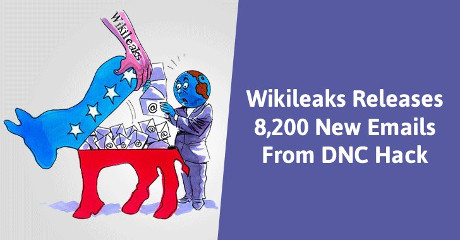Two days before the U.S. Presidential election, Wikileaks released 8,200 emails from the Democratic National Committee (DNC). Which were in addition to its daily drip, drip, drip leaking of emails from John Podesta, Hillary Clinton’s campaign chair.
The New York Times, a sometimes collaborator with Wikileaks (The War Logs (NYT)), has sponsored a series of disorderly and nearly incoherent attacks on Wikileaks for these leaks.
The dominant theme in those attacks is that readers should not worry their shallow and insecure minds about social media but rely upon media outlets to clearly state any truth readers need to know.
I am not exaggerating. The exact language that appears in one such attack was:
…people rarely act like rational, civic-minded automatons. Instead, we are roiled by preconceptions and biases, and we usually do what feels easiest — we gorge on information that confirms our ideas, and we shun what does not.
Is that how you think of yourself? It is how the New York Times thinks about you.
There are legitimate criticisms concerning Wikileaks and its drip, drip, drip leaking but the Times manages to miss all of them.
For example, the daily drops of Podesta emails, selected on some “unknown to the public” criteria, prevented the creation of a coherent narrative by reporters and the public. The next day’s leak might contain some critical link, or not.
Reporters, curators and the public were teased with drips and drabs of information, which served to drive traffic to the Wikileaks site, traffic that serves no public interest.
If that sounds ungenerous, consider that as the game draws to a close, that Wikileaks has finally posted a link to the Podesta emails in bulk: https://file.wikileaks.org/file/podesta-emails/.
To be sure, some use has been made of the Podesta emails, my work and that of others on DKIM signatures (unacknowledged by Wikileaks when it “featured” such verification on email webpages), graphs, etc. but early bulk release of the emails would have enabled much more.
For example:
- Concordances of the emails and merging those with other sources
- Connecting the dots to public or known only to others data
- Entity recognition and linking in extant resources and news stories
- Fitting the events, people, places into coherent narratives
- Sentiment analysis
- etc.
All of that lost because of the “Wikileaks look at me” strategy for releasing the Podesta emails.
I applaud Wikileaks obtaining and leaking data, including the Podesta emails, but, a look at me strategy impairs the full exploration and use of leaked data.
Is that really the goal of Wikileaks?
PS: If you are interested in leaking without games or redaction, ping me. I’m interested in helping with such leaks.
